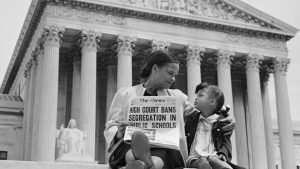Asking About Brown v. Board Is 'Gutter Politics,' According To Senate Judiciary Official
This response should shock the conscience of every American.

New York World-Telegram & Sun Collection/Library of Congress, Washington, D.C. (digital file no. cph 3c27042)
Brown v. Board is one of those opinions that’s reached Ghostbusters status. To paraphrase: “if someone asks you if you think Brown was right… you say YES!” It’s really not that hard. Unless the next words out of your mouth are going to be a Derrick Bell-inspired critical deconstruction of Brown as a dispiriting half-measure that undermined grassroots movements, there is never a scenario where your answer shouldn’t be a full-throated affirmation of the landmark opinion.
But Michael Davis, last seen bragging to the press about all the people he fired so he could clerk for Gorsuch, doesn’t think it’s right that people ask Trump’s nominees about Brown. In his role as chief counsel for nominations on the Senate Judiciary Committee, Davis took questions over the phone from advocacy groups in Iowa earlier this month, giving us his earnest thoughts on raising Brown v. Board at hearings:

Tackling Deposition Anxiety: How AI Is Changing The Way Lawyers Do Depositions
I think it’s cheap political games and cheap racial politics going on with the Brown v. Board of Education discussion . . . It is gutter politics that should not be involved with judicial nominations.
It strikes me that there’s really no reason why asking a judicial nominee about one of the most famous opinions of all time would constitute “politics” of any sort. Is it because Davis feels the issue is so well-settled as to be irrelevant? There’s a school district in Mississippi that only desegregated last year. It would seem that this is very much a live legal issue. The only scenario where talking about Brown could ever be embarrassing for a nominee is if staying truthful under oath would require them to say, “no, I think segregation is good.” Which, Occam’s Razor and Wendy Vitter’s hearing would suggest, is the real problem Davis has here. Because if telling the truth under oath allowed a nominee to say, “of course the famous, unanimous Supreme Court ruling was correct,” then this wouldn’t be an issue at all.
But let’s explore this “gutter” language a bit more. This isn’t some obscure “gotcha” precedent like Senator Kennedy’s dumb refresher on outdated abstention doctrine cases. This is front and center of every Con Law course. Hell, this is front and center of every Middle School civics course. But even if one labored under the delusion that this wasn’t a “fair” question, where does that make the leap to “gutter” language? There’s a long history in this country of using “garbage” and “sewage” analogies for race. It’s shameful.
Davis serves as chief counsel for nominations, placing him in charge of shepherding the bucket of deplorables that make up Trump’s judiciary nominees to confirmation. In fairness, there have been several competent conservative judges nominated by this administration — but that’s been far overshadowed by the cynical drive to pack the judiciary’s ranks with questionably qualified and troublingly retrograde warm bodies. While Brett Talley: Kid Ghosthunter is the most infamous example, he’s hardly alone. John Bush made it on the Sixth Circuit on a résumé consisting primarily of “lawyer who blogs about hating gays,” and Steve Grasz landed on the Eighth despite earning a “not qualified” rating from the ABA, which is almost impossible to earn. Toward the end of the video, Davis is actually asked about Grasz’s rating and sluffs it off as the ABA overreacting to “anonymous hearsay drive-by shootings” that Grasz is “gratuitously rude.” Apparently, the whole bit about Grasz supporting gay conversion therapy didn’t register a mention.
Sponsored

Tackling Deposition Anxiety: How AI Is Changing The Way Lawyers Do Depositions

Legal Contract Review in Under 10 Minutes? Here’s How

Curbing Client And Talent Loss With Productivity Tech

Curbing Client And Talent Loss With Productivity Tech
But he’s the point person on these nominations. He has to be ready to put lipstick on some of the more porcine elements of this cadre of nominees. Perhaps he’s got better answers on the subject of diversity? Well… no. When asked about that subject:
This is a terrible cheap shot against Chairman Grassley and it doesn’t surprise me that you would say that.
It doesn’t surprise me that he’d say that either because it’s an empirical fact.
Professor Carl Tobias has a breakdown of Trump’s nominations and, when he published this review, Trump had put up 113 nominations and only 10 are people of color. That’s a lower representation of diversity than any administration since Reagan (when the pool of diverse attorneys was markedly smaller).
But when Jamal Watkins of the NAACP asked about diversity, Davis explained that he’s got diversity covered, pointing out that Amy Coney Barret is “a Catholic mother of seven, she’s adopted two of those children from Haiti.”
Sponsored

Data Privacy And Security With Gen AI Models

How Thomson Reuters Supercharged CoCounsel With Gen AI Advances

Wow. Note, this is the first example he manages to come up with. First! In a speech that sounds suspiciously like “I know black people,” his first example of diversity is someone whose racial diversity bona fides are that she knows black people.
Davis continues naming the handful of diverse judges coming out of this administration, until Watkins interjects that this is basically an “I have black friends” speech. Davis responds, “Well, I’m sorry if what I just said doesn’t fit into your narrative.”
Numbers aren’t really a “narrative,” Skippy. The question on the table was about the data point that diversity among federal judges is going down, and your answer was a bunch of anecdotes about exceptions that prove the rule because they’ve adopted kids from Haiti. Look, I don’t expect an honest answer because we’re all adults here and know the truth is the administration is more interested in activist right-wing judges than diversity and, for some crazy reason, it’s hard to find minorities queuing up for the “Make America Antebellum Again” agenda. But at least have the basic respect to not slime the question as if it’s some kind of conspiracy theory.
And, if we’re going to go down the “I have black friends” trail, let’s consider another anecdote from the administration’s nomination process.
When he was nominated, David Lat noted that “The main problem for Farr is age (he’s in his 60s),” which seems so long ago now. Since then his “main problem” has rolled through being accused of misleading the Senate by a former DOJ official and “ties to white supremacists.” Davis addressed the latter charge:
To say that someone is a white supremacist is a serious allegation and it sounds to me like you don’t want to have a serious conversation.
Well, Farr’s partner was on the board of the Pioneer Fund, an organization that funded eugenics research into attempts to prove that African Americans are genetically inferior, which seems like the most literal possible definition of white supremacy. Now maybe he shouldn’t be his law partner’s keeper, but it’s not an unfair area of inquiry. Davis said this is the first he’d heard about this and that it was not raised at his committee hearing (it was) and that no one submitted any letters on this subject (they did) because otherwise he’d have read about this because he reads all the letters (he apparently doesn’t).
Taking questions from aggrieved groups is a difficult task, but that’s where a seasoned spokesperson is supposed to warmly dissemble and fill an hour saying nothing. Davis went with the alternate “blithely dismissive” approach. It’s refreshingly more befitting the nature of the current process of filling the nation’s judiciary — a judiciary riddled with openings because Davis’s bosses spent years blocking judicial nominees and now cry about a crisis entirely of their own making. Just accept the nominees as they come. Don’t ask questions, don’t poke into their past, there’s a judicial crisis after all!
And certainly don’t get into irrelevant “gutter” issues like race.
President Donald Trump and Federal Bench Diversity [Washington & Lee Law Review]
Earlier: Law Clerk Explains To Reporter That He Really Is Kind Of A Jerk
Originalists Do Not Think Segregation Was Unconstitutional, And Wish You’d Stop Bothering Them About It
Senator Embarrassing Judicial Nominees With Remedial Law School Questions
 Joe Patrice is an editor at Above the Law and co-host of Thinking Like A Lawyer. Feel free to email any tips, questions, or comments. Follow him on Twitter if you’re interested in law, politics, and a healthy dose of college sports news.
Joe Patrice is an editor at Above the Law and co-host of Thinking Like A Lawyer. Feel free to email any tips, questions, or comments. Follow him on Twitter if you’re interested in law, politics, and a healthy dose of college sports news.







